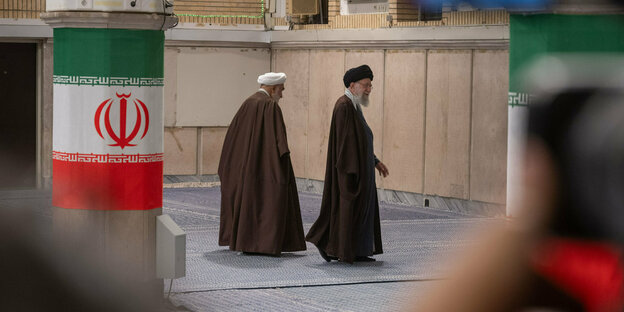The Mullah Republic sees itself as a protective power for the Palestinians. Paradoxically, the Arab states are moving closer to Israel.

Ayatollah Khamenei, the political and religious leader of Iran Photo: Arne Immanuel Bänsch/dpa
With the Iranian airstrike against Israel, the Middle East conflict has taken a new and dangerous turn. Wildfire warnings are popping up everywhere. At the same time, the conflict returns to its beginnings in the first decades after the founding of the State of Israel in 1948: at that time it was an interstate conflict, with Israel on one side and a series of Arab despotisms on the other.
The Arab countries wanted to wipe Israel off the map, while Israel, in turn, wanted to ensure its own existence, including through territorial expansion. Iran played no role then. Hardly anyone talked about the Palestinians, and when they did, they simply served as extras in the propaganda war to support Arab interests. They also did not play any political role.
This only changed in the early 1970s, after the Israeli conquest of the West Bank in the 1967 Six-Day War and the rise of the secular-oriented PLO as the political representative of the Palestinians. However, this emancipation had limits: those of the Arab States, on whose support the PLO continued to depend. However, the Palestinians were able to assume an independent role in the conflict. It remained this way even as Islamists like Hamas overtook the old secular forces. But they also continued to depend on the good will of some states like Qatar.
Above all, Iran assumed the role of godfather to the Palestinians, while several Arab states made peace with Israel, which had moved to the right, and since then no longer paid much attention to the Palestinian conflict. The Shiite regime in Tehran has always maintained a lack of special relationship with Israel, the archenemy, which is not even called by name, but only as a “Zionist entity.”
After its attack, Iran made it clear that it is not interested in escalation at this time.
However, it is doubtful that Iran really cares about the well-being of the Palestinians. Above all, the Mullah regime with its satellites, from the Yemeni Houthis to the Lebanese Hezbollah and the Palestinian Sunni Hamas, wants to expand its own role as a regional power in order to dominate the Arab region. Precisely for this reason, Palestinians are in danger of once again becoming objects for whom people feel warm affection for their terror, but whose death is accepted with approval.
At the same time, Iranian claims are causing states on the Arabian Peninsula to move closer to Israel because they do not want to be dominated by Tehran. In this sense, with the attack on Israel, Iran has achieved the opposite of what was convenient for it: the Arab States are now getting closer to Israel, which in turn is exposed to less criticism for the conduct of the war in Gaza. of the threat from Tehran
Bloodbath avoided
We may now be at the beginning of a war between Israel and Iran. Israel is unlikely to follow the advice of Western allies and refrain from retaliating. Nor would it be Benjamin Netanyahu's specialty if he gave the order to attack. Israel has always depended on deterrence in its struggle for existence. Things didn't turn out badly, at least better than the failed Oslo peace agreement. Iran's successful defense against missile and drone attacks also demonstrates its own military capabilities. We do not want to imagine the bloodbath that could have occurred without defensive measures.
Israel has every right to respond militarily to this attack, even if Israel lit the fuse by attacking the Iranian consulate in Damascus. After its attack, Iran made it clear that it has no interest in an escalation at this time and has all but begged Netanyahu to leave his missiles in the silos.
Israel also doesn't want a big war with Iran. Enough with the “small” one in the Gaza Strip (which is actually not small, but brutal and long) and the constant skirmishes with Hezbollah on the border with Lebanon, which could easily turn into a war. The West is warning Israel against an escalation that neither US President Joe Biden nor the EU can use in the election campaign and that, with rising oil prices and uncertain trade routes, could derail a weakening global economy. Although Russia collaborates closely with Iran, in the event of war it must fear that supplies of Iranian combat drones for the Ukrainian war will run out.
No middleman in sight
So there is little today to suggest the conflagration that is often evoked. Opponents remain more likely to return to the old status quo. And it is not necessarily particularly peaceful: with Israel's war against Hamas, Israeli hostages still held captive in the Gaza Strip, Hezbollah attacks on Israel, drones in Yemen, the presence of the Iranian Revolutionary Guard in Syria, the trend Israeli towards violence against settlers on the West Bank.
But the region remains further than ever from a peace solution. In light of the October 7 pogrom and the ensuing enthusiasm among the population of Gaza and the West Bank, there are hardly any Israelis left who can even imagine a peace of any kind with the Palestinian side. The Palestinian side's jubilation over the mass murder shows that things are no better the other way around. There is no visible actor in the region that can bring the conflicting parties together. The EU has no importance in the Middle East and in the United States, the important diplomat Trump threatens.
